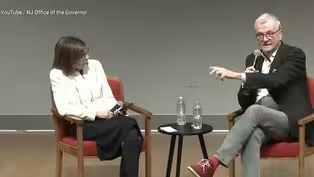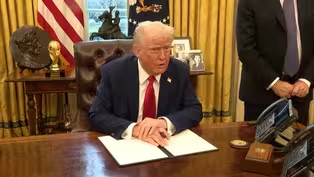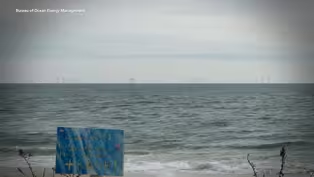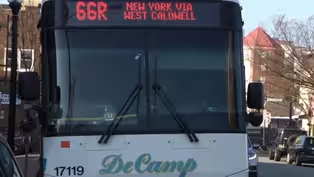NJ Spotlight News
Tight timetable for new NJ Transit boss
Clip: 2/4/2025 | 12m 8sVideo has Closed Captions
Interview: Kris Kolluri, new CEO of New Jersey Transit
Kris Kolluri, the new president and CEO of New Jersey Transit, has 13 months at the helm of the transit agency before Gov. Phil Murphy leaves office. Murphy has vowed to fix the agency even "if it kills me." NJ Transit faces a number of challenges, including a potential financial deficit, the threat of a strike by union engineers, trouble with rail reliability and Northeast Corridor disruptions.
Problems playing video? | Closed Captioning Feedback
Problems playing video? | Closed Captioning Feedback
NJ Spotlight News is a local public television program presented by THIRTEEN PBS
NJ Spotlight News
Tight timetable for new NJ Transit boss
Clip: 2/4/2025 | 12m 8sVideo has Closed Captions
Kris Kolluri, the new president and CEO of New Jersey Transit, has 13 months at the helm of the transit agency before Gov. Phil Murphy leaves office. Murphy has vowed to fix the agency even "if it kills me." NJ Transit faces a number of challenges, including a potential financial deficit, the threat of a strike by union engineers, trouble with rail reliability and Northeast Corridor disruptions.
Problems playing video? | Closed Captioning Feedback
How to Watch NJ Spotlight News
NJ Spotlight News is available to stream on pbs.org and the free PBS App, available on iPhone, Apple TV, Android TV, Android smartphones, Amazon Fire TV, Amazon Fire Tablet, Roku, Samsung Smart TV, and Vizio.
Providing Support for PBS.org
Learn Moreabout PBS online sponsorshipWell, after holding leadership roles in a number of the states, transportation and infrastructure departments through economic highs and lows and multiple administrations, Kris Kolluri may be taking on his toughest challenge yet as the new CEO and president of New Jersey Transit, a role he'll hold until Governor Murphy leaves office next year.
The agency is facing a potential strike by its union engineers, trouble with rail reliability and northeast corridor disruptions and planning for the World Cup in 2026, just to name a few.
It's a tall order.
And Kris Kolluri is with me now to talk about how he'll tackle it.
Kris, Welcome.
Thanks so much for agreeing to sit down.
I named a couple of those items.
You came in and you made some restructuring changes.
How do you put on a lens of of steering this agency in the right direction in the 13 months that you have?
So I tend to look at everything in life, including especially a rail operations, bus operations in terms of control bolts and uncontrollable.
Look, it is going to be a fact that over the next 13 months, there are some things we'll be able to control and some things we're not going to be able to control.
My expectation and my team's expectations over the next 13 months is to look at baseline things so we can improve Windows on multi-level is what people have been asking for that for years.
And our hope and I will announce in the next 35 days a plan on how we intend to replace them and how we intend to do it on a schedule.
Those are things that the customers have asked for.
Our job is to respond to their priorities.
So at this first debate, primary debate for the Democratic candidates for governor, every single one.
When asked to rate, the agency gave it an F. Do you agree?
I think we need to separate the world of politics and operations.
I think the people running for governor have every right, as they should, to have their perception of what's happening at transit.
I want to focus on what is actually happening on the ground.
The governor should get a lot of credit for the work that he has done over the last seven years to put improvements in place.
What our expectation now is to again, work on I have a three point to the 12 point plan of things that I want to get done that will actually help move the needle.
13 months is not a long time, as you know.
Can you give us an example?
Yeah.
Look, I mean, my fiscal outlook and stability is something that we all have to think about in the environment we're in.
That's on the rail rolling stock and capital projects, especially what the president has announced with the executive order.
We need to make sure we're prepared to respond, but still maintain the projects that are currently important to New Jersey residents.
And once that can be done.
How do you navigate that?
And I'm sorry to interrupt you.
How do you navigate that?
Because you had these executive orders come down.
It's still very unclear to whether or not your agency is going to be affected by any of that funding.
But you've got projects like Gateway, which you were the head of the Gateway Development Commission, which are tied to and have money allocated for from the federal government to get done or any of these projects going to be affected.
The short answer is we don't know.
And that is the troubling part.
Right.
We have $8 billion in capital projects underway right now, and that means on a monthly basis, we get $300 million in reimbursements from the federal government.
That's a lot of money to be on the hook for on projects that are already underway.
That doesn't include the Hudson Tunnel project.
Right.
So our expectation is within the first few hours of the announcement of the executive order, we started doing an analysis of what is impacted and what our outflow of cash looks like every single month.
Those are real numbers, right?
I mean, the impact is real.
We take at face value where the president and the administration have withdrawn the IG, the OMB circular.
But what is still not clear is what the breadth and scope of the impact could be tomorrow, next week, and next month.
The way you prepare for it is to be realistic on what we're spending a month and what how much we're getting reimbursements for.
So far, we've been getting reimbursements from the federal government for all our requests.
But the good thing.
So the money hasn't stopped.
Money has not stopped.
So the question really is, how do you put out the next set of projects for which the state is on the hook now?
And at some point, we will not have the money to pay for all these things.
And that's a situation you do not want to ever be in.
It happened when I was with Governor Corzine, when there was a shutdown of the government, and we had to stop essentially a lot of contracts.
The good news there was we were able to pay back and start the projects here after a few weeks or maybe a month where there is no more money to give out unless the legislature acts.
Right.
But and we're not the only game in town.
We'll have other agencies.
The governor yesterday said that our total exposure, not just transit and DOD is $27.5 billion.
Which, by the way, the legislature has yet to specifically dedicate this new corporate transit fee to help fund New Jersey transit.
What is your conversation like with those lawmakers in telling them clearly, what is this need?
So interestingly enough that the corporate transit fees were supposed to cover the operating budget.
Right.
And again, the legislature and the governor worked extremely hard.
It was a difficult issue.
But we are about the only agency in this area.
We're going into fiscal year 2026.
I can actually project a plan that makes sense.
And we also tried to do it in a manner that is very carefully articulated.
I've only been in those job for three weeks, but I've been in this position as chairman before, so perhaps my learning curve is a lot smaller.
But New York, if this congestion pricing doesn't stay there in a world of hurt and and that's what the governor has been saying, we need to be fair and equitable.
The governor in the state of state said that New Jersey doesn't look to other states to solve its problems.
We solve our own problems.
So and that's what we're all working towards to make sure we have an operating budget that's good and a capital budget that's based on.
You mentioned congestion pricing.
What if the trains looked like the busses looked like the light rail?
Are you is data showing that there are more commuters taking mass transit?
And do you feel like the agency is up to it?
So two ways to think about it.
One is we have about 200,000 busses going into New York out of a 500,000 daily trip.
Number two, statewide on the trains, we're at 140,000 trips going into New York versus 200,000 for the statewide.
So on one mode, where about 70% of traffic going into New York on the busses, we're about 40%.
When you look at data, there's certainly anecdotal evidence that there's a slight uptick in certain lines on the busses.
But on the rail, just to give you a perspective, we were about 80% during the holiday season.
We're down to 70%.
So you don't then the factors that informed those numbers, Brianna, are not just based on congestion pricing, whether, again, there's uncontrollable events and changes that are happening in the region from an economic standpoint drive a lot of this.
So I have not seen conclusive data that says that congestion pricing is leading to a appreciable number of riders that we can attribute to it.
There's a lot of moving parts.
I think the jury's still out.
Let me ask you quickly about this potential conflict that may be coming up with the engineers union.
They rejected the latest proposal for wage increases from the federal board that's overseeing these contract negotiations.
Did you meet with the union and and are we looking at a potential strike in March?
Look, the unions always have the right to strike after this last presidential emergency board decision, which, as you correctly said, went in our favor.
They think they thought based on an informed decision, that we should be closer to 4% than the 14% that the union has asked.
But my approach through my entire life is just because there's a war path doesn't mean you take it.
So the very next day I got the PDB, the fourth day on my job.
I called the head of the union.
I asked him to meet.
I asked him to meet and try to have a reasonable negotiation.
He graciously accepted my invitation.
We met with him last week.
We're going to meet with him again next week.
We both agree that he wants a fair deal.
I have a deal.
I also want it to be fair.
But I'm a fiduciary to the taxpayers.
Corporate transit.
Transit fees are a great example.
If all of that money is used to pay the union their wages and now have to give all the same advantage to all the other unions, there will be no more corporate transit transit fees left.
So you're confident, though, that this will come to a resolution before that March date?
I think if we keep both sides, keep our emotions in check and manage to negotiate as reasonable parties, we can get there.
I am look, I still have some 50 some odd days left in this process.
I am hopeful that we can come to a deal so we can avert the strike, because for me, Brianna, 100,000 daily riders will be deeply impacted on a strike.
I don't think the union wants it.
I certainly don't want it.
I got to ask you, because this is what I think most folks are looking to hear about commuter issues.
Train cars that are closed when the commuter trains are packed, standing room only reliable service.
The departure vision says your train is on time.
You get to the platform, your train doesn't show up.
You wait an hour or 2 hours late for work.
I mean, folks are still very frustrated and feel like, despite the progress that you outline, the very simple task, the not so simple task of getting people to and from is just not happening.
So how are you correcting that?
I know we're short of time.
Let me just try to give a three bullet point answer.
One on communications.
I don't think the customers are wrong.
On Friday, I instituted a change to our alert system, and today or tomorrow we're going to.
Every message should be the same.
You can't have one message on your on your phone and another message on the station announcement.
So what I've asked for is a example of a unified message to this one single fact based public service announcement that was already in place as of Friday.
Second is we also have to look at look, I'm not sure everybody understands it or needs to understand it.
The fact of the matter is Amtrak runs the entire corridor.
Not to put blame on them, but on time performance.
Just on New Jersey transit trains is 94% on the corridor.
With Amtrak's challenges, we're down to 86%.
That's a real impact.
So last year alone, 6.3 million riders in New Jersey were impacted by Amtrak performance.
That isn't me saying it.
That data backing me up.
And the third thing is, it is a fact that we need 250 new rail cars and 1000 new busses to make it more reliable.
I don't know why in the 21st century, we still have to rely on equipment from 1966.
And the answer to all that is very expensive.
And the federal government typically funds those rail cars and busses.
So very quickly, World Cup 2026, Will the agency be ready?
I'm watching to be ready in 2025 because World Cup Club championships, in my view, are as important and the demand on our ridership will be as important.
And our performance, you will measure me this year.
Kris Kolluri thanks so much for coming in.
We appreciate.
It.
Thank you so much.
Gov. Murphy sparks outrage over statement about immigrant
Video has Closed Captions
Clip: 2/4/2025 | 1m 17s | Spokesperson for governor’s office says Murphy’s remarks were misinterpreted (1m 17s)
How Trump tariffs could impact jobs and prices in NJ
Video has Closed Captions
Clip: 2/4/2025 | 4m 51s | Pressure on consumers and jobs expected if businesses must pay more to import and export (4m 51s)
New Jersey adapts to loss of offshore wind in near future
Video has Closed Captions
Clip: 2/4/2025 | 4m 42s | EDA said it will seek 'alternative uses' for the Wind Port in Salem County (4m 42s)
NJ bus company shuts down after 155 years
Video has Closed Captions
Clip: 2/4/2025 | 1m 10s | DeCamp Bus Lines will cease operations on Feb. 28 (1m 10s)
Providing Support for PBS.org
Learn Moreabout PBS online sponsorship
- News and Public Affairs

Top journalists deliver compelling original analysis of the hour's headlines.

- News and Public Affairs

FRONTLINE is investigative journalism that questions, explains and changes our world.












Support for PBS provided by:
NJ Spotlight News is a local public television program presented by THIRTEEN PBS



